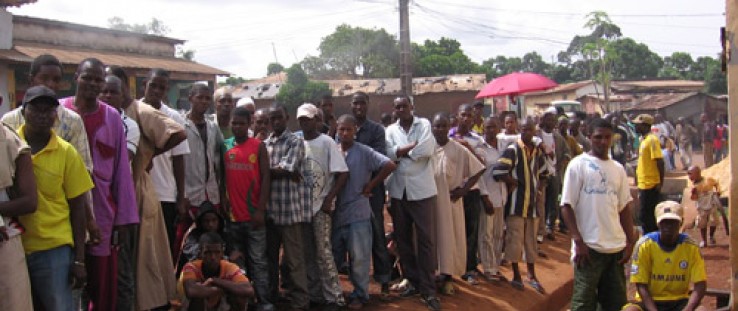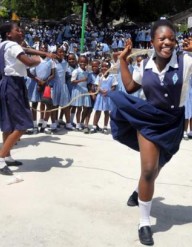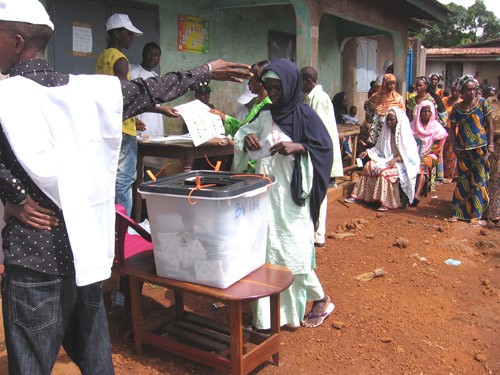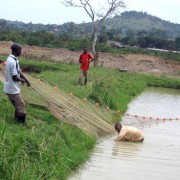 Guineans line up in Conakry to vote in the June 27 elections.
Glenn Slocum
Guineans line up in Conakry to vote in the June 27 elections.
Glenn Slocum
 Guineans line up in Conakry to vote in the June 27 elections.
Glenn Slocum
Guineans line up in Conakry to vote in the June 27 elections.
Glenn Slocum
After a long succession of authoritarian and military rulers, Guinea welcomed its first democratically elected president since the country gained independence 52 years ago.
The elections came on the heels of one of the most brutal periods in Guinea, during which the army slaughtered people demonstrating for democracy. Against all odds, and although far from perfect, Guinea's first foray into the democratic process was marked by high levels of preparedness and transparency in West Africa, which has recently been besieged by political turmoil.
President Barack Obama offered his congratulations to the Guinean people by declaring, "The past year [in Guinea] will remain a powerful example of how a country at such a pivotal moment can make a choice for a better future."
In the runoff election held in November 2010, Alpha Conde was declared Guinea's president with 52.5 percent of the vote. And in an historic inauguration Dec. 21, Conde took the oath of office calling for unity in the West African nation.
The election, which USAID supported through all aspects of voting preparation, comes just two years after a military coup and one year after violence shattered a peaceful, pro-democracy rally.
When former president Lansana Conté died in 2008 after 24 years in office, the military seized power and suspended the constitution. Led by Moussa Dadis Camara, the junta promised future elections and civilian rule. Nevertheless, Camara announced plans to run for president.
In protest, unarmed civilians gathered in the capital city, Conakry, on Sept. 28, 2009. Camara's junta ordered soldiers to attack, and protesters were trapped in a soccer stadium. That day, more than 150 protesters were killed, 1,000 injured, and more than 100 raped by members of the military. The rampage of violence continued, sending shockwaves around the world.
Camara left the country in December 2009 to seek medical treatment after being wounded in a failed assassination attempt, leading to an extended period of calm.
When the junta announced in 2009 that it would postpone elections due to lack of funding, USAID, the second-largest bilateral donor to Guinea's elections, responded rapidly, providing $1.5 million to close the funding gap. Partner organizations included the International Foundation for Electoral Systems (IFES), the National Democratic Institute (NDI), the Search for Common Ground, the Carter Center, and Faisons Ensemble.
Outreach, Education, and Biometrics
Prior to the first round of elections, USAID supported voter outreach and education programs, including radio and TV ads, caravans, banners, posters, and billboards. Biometric voter cards assured transparency and permitted the registration of over 4 million Guineans, out of a total population of 10 million.
Then-Mission Director Glenn Slocum visited several dozen polling stations in Conakry during the first and second rounds.
"The first round attracted 77 percent of eligible voters, including a high turnout of women and youth," he reported. "The experience of witnessing long lines of people waiting patiently in the hot tropical sun to exercise, for the first time in their lives, their right to choose their next leader was the most moving sight in my nearly 40 years working in Africa. When contrasted to the horrors of the army massacre of innocent citizens just nine months before, it stands out as a huge victory for democracy in Africa."
Given that Guinea had never managed an open elections process before, their inexperience risked jeopardizing the process. In the months of preparation for the elections, Anna Diallo, USAID/Guinea's democracy/governance advisor, worked with the newly formed Independent National Electoral Commission (CENI) and held weekly meetings with partners and officials from CENI and the United Nations. USAID also worked closely with U.S. Ambassador to Guinea Patricia Moller and her staff to coordinate the necessary diplomatic support, which was critical to keep the process moving. This support crystallized into an international "Contact Group" headed by the African Union that united diplomats, both within and outside Africa, to help Guinea conclude its successful elections.
Round One Irregularities
During the first round, international and domestic observers found that election staff and party representatives were insufficiently trained on their duties at the polling stations, creating considerable confusion in tabulating the results. While the Supreme Court validated the results, it disallowed a quarter of the ballots for technical issues, but the results were certified, and the top two candidates prepared for a runoff election.
To correct problems identified in the first round of voting, Guinea's Independent National Electoral Commission requested USAID assistance to re-train over 40,000 poll workers, 2,000 domestic observers, and representatives of the two candidates.
With USAID support, Search for Common Ground trained journalists and coordinated media promotion, which included a radio special—FM Guinea 2010— broadcast simultaneously on Guinea's 16 private radio stations. In coordination with other donors through the United Nations Development Program, USAID also helped reprint and display voter lists at polling stations before election day and procure additional electoral material for new voting stations created following protests by the two candidates after the first round.
Smooth Second Time Around
The second round of voting ran smoothly as election workers and party workers understood their roles and performed their duties with more skill. National observers and party representatives were almost ubiquitous, and the verification process was conducted professionally and without major conflict or protest. In a step cited as a best practice to be replicated in the region, the elections commission operations and the processes for transmitting results were opened to representatives of the two candidates, which promoted transparency and inclusiveness.
"The fact that the representatives of the two candidates were involved in each decision-making process in the second round, Elections Day operations, and tabulation and transmission of results left little room for fraudulent activities and irregularities," said USAID's Diallo. "This facilitated the validation by the Supreme Court of the results." Challenger Cellou Dalein Diallo initially contested the results of the runoff, leading to some violence among party supporters and police. However, after the Supreme Court upheld Conde's victory on Dec. 3, Diallo conceded the election in a move observers say bodes well for Guinea's future as a functioning democracy.











Comment
Make a general inquiry or suggest an improvement.